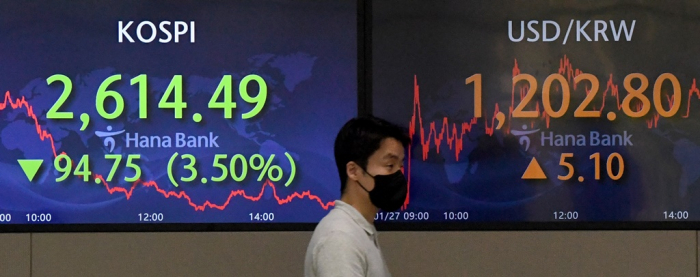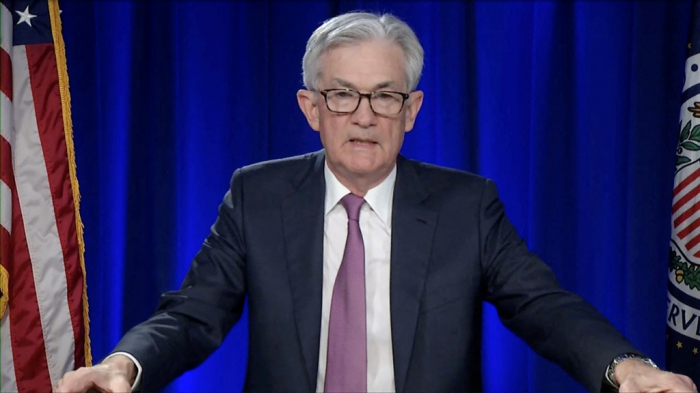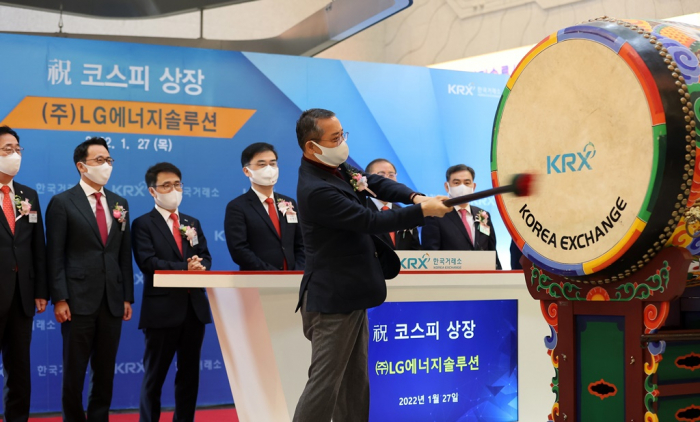Markets
Kospi melts as Fed, LG Energy spur foreign selling
Foreigners dump LG Energy at market debut; local institutional investors scramble for the stock, offloading other shares
By Jan 27, 2022 (Gmt+09:00)
4
Min read
Most Read
Samsung shifts to emergency mode with 6-day work week for executives


CJ CheilJedang to sell feed, livestock unit for $1.4 bn


Samsung Electronics' key M&A man returns; big deals in the offing


Affinity to buy SK Rent-a-Car at $572 mn, more deals expected


Keppel REIT to sell Seoul-based prime office T Tower



South Korean stocks lost ground with the main index entering a bear market on Thursday as foreign investors intensified their selling after the US Federal Reserve suggested a March rate hike. The trading debut of LG Energy Solution Ltd. also soaked up market liquidity.
The heightening geopolitical tensions between Russia and Ukraine stoked concerns over energy supply disruptions and inflation as oil prices hovered around highs not seen since 2014, denting local investor sentiment.
The Kospi tumbled 3.5% to end at 2,614.49, for the first close below 2,700 since Dec. 3, 2020, underperforming its regional peers: JapanŌĆÖs Nikkei index saw a 3.11 percent decline and ChinaŌĆÖs Shanghai Composite index posted a 1.78 percent loss.
The Kospi slumped 21.2 percent from its previous peak of 3,316.08, a 52-week high, to enter a bear market. It became the only index in Asia in a bear market excluding the Hang Seng China Enterprises Index in Hong Kong, which continued to decline last year.
Foreign investors dumped a net 1.6 trillion won ($1.3 billion) in stocks on SeoulŌĆÖs main bourse, the largest offloading since Aug. 13, 2021, according to the Korea Exchange data.
That came as local financial institutions slashed holdings of existing shares to buy LG Energy stocks, the second-largest company by market capitalization in the country, weighing on the overall market when investor sentiment was already soured by external factors. Domestic institutional investors bought 3 trillion won worth of LG Energy stocks, but their net purchases totaled a mere 1.8 trillion won, indicating they unloaded other stocks to do so.
ŌĆ£The FedŌĆÖs monetary policy normalization ramped up volatility in Asian stock markets, but Korean shares fell more as institutional investors sold other stocks to add LG Energy,ŌĆØ said Lee Kyoung-min, an analyst at Daishin Securities. ŌĆ£It is better to take a conservative stance since the markets are expected to see more volatility due to concerns over the economy overall.ŌĆØ
FIVE US INTEREST RATE HIKES?
The Fed said on Wednesday it is likely to raise interest rates in March, given the improving economy and stubbornly high inflation.
Subsequent rate hikes and an eventual reduction in the FedŌĆÖs asset holdings would follow as needed, said US central bank chief Jerome Powell in a press conference following the Federal Open Market Committee.

The hawkish stance pushed up US Treasury yields with two-year yields that reflect interest rate expectations soaring to around 1.19 percent from 1.01 percent.
Fed funds futures have fully priced in one 25-basis-point raise for the Fed's March meeting, and another three hikes for this year, analysts said. But some bet on more tightening.
ŌĆ£The market started pricing in five rate hikes this year with 22 percent odds for a 50 bp-increase in March,ŌĆØ said a currency trader for a Southeast Asian bank.
The South Korean won currency touched its weakest point since July 2020, accelerating foreign selling in the local stock markets.
LG ENERGYŌĆÖS BACKDRAFT
LG EnergyŌĆÖs listing also weighed on the overall market. The worldŌĆÖs second-largest battery producer made a stellar trading debut with its share opening at 597,000 won, nearly double its IPO price of 300,000 won.
It closed down 15.41 percent at 505,000 won as foreign and retail investors dumped the stock to book profits. But its market capitalization stood at 118 trillion won, becoming the No. 2 company after Samsung Electronics Co.
So, passive funds, which track a market index or specific market segment to determine what to invest in, needed to sell other stocks to add LG Energy in order to reflect its market capitalization into their portfolios. The selling hurt the overall market.
In addition, exchange-traded funds need to adjust their holdings. Samsung SDI Co. and LG Chem Ltd., which were in the existing ETFs focusing on the secondary battery sector, lost 6.16 percent and 8.13 percent, respectively.

WON CURRENCY
As those bearish factors in the local stock markets prompted foreign selling, the won also tumbled.
The South Korean currency eased 0.4 percent to finish the domestic foreign exchange market at 1,202.8 against the dollar, the weakest close since July 20, 2020.
The won may weaken further, probably to 1,250 in the near term as the┬Ācountry is slated to see a trade deficit for a second straight month in January for the first time since the 2008-09 global financial crisis on higher energy prices.
The foreign exchange authorities warned of potential measures to stabilize the won as its weakness could spur more capital outflows.
Bank of Korea Deputy Governor Park Jong-seok said, if necessary, the central bank will take market stabilization measures in a timely manner while strengthening its monitoring of risk factors at home and abroad.
Foreign exchange authorities, both the BOK and the finance ministry, were known not to plan to buy won in the market since the local unit is expected to rebound eventually without intervention, probably to firmer than the 1,200 level, sources said.
The central bank is expected to raise interest rates, maintaining interest rate differentials between South Korea and the US, while the fundamentals of AsiaŌĆÖs fourth-largest economy held strong, they added.
Write to Sul-Gi Lee and Ik-Hwan Kim at surugi@hankyung.com
Jongwoo Cheon edited this article.
More to Read
-

-
 IPOsOne in 10 Koreans rushes for LG Energy shares ahead of $8.6 billion IPO
IPOsOne in 10 Koreans rushes for LG Energy shares ahead of $8.6 billion IPOJan 19, 2022 (Gmt+09:00)
4 Min read
Comment 0
LOG IN


